Related Research Articles

The Boxer Rebellion, also known as the Boxer Uprising or Boxer Insurrection, was an anti-foreign, anti-imperialist, and anti-Christian uprising in North China between 1899 and 1901, towards the end of the Qing dynasty, by the Society of Righteous and Harmonious Fists, known as the "Boxers" in English due to many of its members having practised Chinese martial arts, which at the time were referred to as "Chinese boxing". It was defeated by the Eight-Nation Alliance of foreign powers.

Arthur Henderson Smith was a missionary of the American Board of Commissioners for Foreign Missions noted for spending 54 years as a missionary in China and writing books which presented China to foreign readers. These books include Chinese Characteristics, Village Life in China and The Uplift of China. In the 1920s, Chinese Characteristics was still the most widely read book on China among foreign residents there.

The Peking Legation Quarter was the area in Beijing (Peking), China where a number of foreign legations were located between 1861 and 1959. In the Chinese language, the area is known as Dong Jiaomin Xiang, which is the name of the hutong through the area. It is located in the Dongcheng District, immediately to the east of Tiananmen Square.

In the early 19th century, Western colonial expansion occurred at the same time as an evangelical revival – the Second Great Awakening – throughout the English-speaking world, leading to more overseas missionary activity. The nineteenth century became known as the Great Century of modern religious missions.

The Battle of Peking, or historically the Relief of Peking, was the battle fought on 14–15 August 1900 in Beijing, in which the Eight-Nation Alliance relieved the siege of the Peking Legation Quarter during the Boxer Rebellion. From 20 June 1900, Boxers and Imperial Chinese Army troops had besieged foreign diplomats, citizens and soldiers within the legations of Austria-Hungary, Belgium, Britain, France, Italy, Germany, Japan, Netherlands, Russia, Spain and the United States.
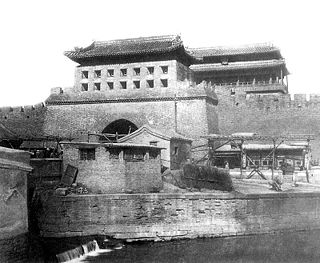
Yongdingmen, was the former front gate of the outer city of Beijing's old city wall. Originally built in 1553 during Ming Dynasty, it was torn down in the 1950s to make way for the new road system in Beijing. In 2005, the Yongdingmen was reconstructed at the site of the old city gate. This new gate is disconnected from the original road leading towards the gate and into the city.
Presbyterian Mission Agency is the ministry and mission agency of the Presbyterian Church (U.S.A.). Founded as the Western Foreign Missionary Society by the Presbyterian Church in the United States of America in 1837, it was involved in sending workers to countries such as China during the late Qing dynasty and to India in the nineteenth century. Also known as the Foreign Missions Board in China, its name was changed by the Old School body during the Old School–New School Controversy to the Presbyterian Board of Foreign Missions.

Edwin Hurd Conger was an American Civil War soldier, lawyer, banker, Iowa congressman, and United States diplomat. As the United States' minister to China during the Boxer Rebellion, Conger, his family, and other western diplomatic legations were under siege in Beijing until rescued by the China Relief Expedition.

The "China Martyrs of 1900" is a term used by some Protestant Christians to refer to American and European missionaries and converts who were murdered during the Boxer Rebellion, when Boxers carried out violent attacks targeting Christians and foreigners in northern China.
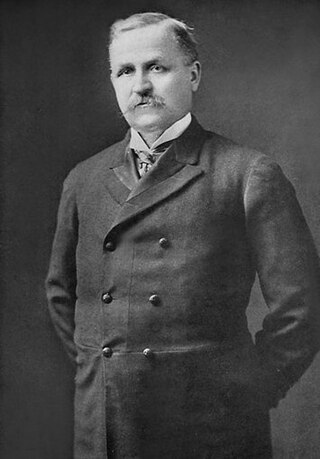
William Scott Ament was a missionary to China for the American Board of Commissioners for Foreign Missions (ABCFM) from 1877, and was known as the "Father of Christian Endeavor in China." Ament became prominent as a result of his activism during the Boxer Uprising and controversial in its aftermath because of the personal attacks on him by American writer Mark Twain for his collection of punitive indemnities from northern Chinese villages.

The Twain–Ament indemnities controversy was a major cause célèbre in the United States of America in 1901 as a consequence of the published reactions of American humorist Mark Twain to reports of Rev. William Scott Ament and other missionaries collecting indemnities from Chinese people in the aftermath of the Boxer Uprising.
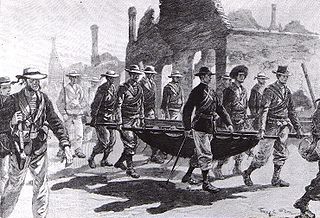
The Seymour Expedition was an attempt by a multinational military force to march to Beijing and relieve the Siege of the Legations and foreign nationals from attacks by Qing China's government troops and the Boxers in 1900. The Chinese army and Boxer fighters defeated the Seymour armies and forced them to return to Tianjin (Tientsin). It was followed later in the summer by the successful Gaselee Expedition.

The siege of the International Legations was a pivotal event during the Boxer Rebellion in 1900, in which foreign diplomatic compounds in Peking were besieged by Chinese Boxers and Qing Dynasty troops. The Boxers, fueled by anti-foreign and anti-Christian sentiments, targeted foreigners and Chinese Christians, leading to approximately 900 soldiers, sailors, marines, and civilians from various nations, along with about 2,800 Chinese Christians, seeking refuge in the Legation Quarter. The Qing government, initially ambivalent, ultimately supported the Boxers following international military actions. The siege lasted 55 days, marked by intense combat and a brief truce, until an international relief force arrived from the coast, defeated the Qing forces, and lifted the siege. The failure of the siege and the subsequent occupation of Peking by foreign powers significantly weakened the Boxer Rebellion, leading to its eventual suppression and resulting in increased foreign influence and intervention in China.

Francis Dunlap Gamewell was a Methodist missionary in China. He was the chief of the Fortifications Committee in the Siege of the Legations during the Boxer Rebellion in 1900 and was acclaimed as one of the heroes of the siege.
The China Centenary Missionary Conference, held in 1907 in Shanghai, China commemorated 100 years of Protestant missionary work in China and debated future courses of action. Among other actions, the conference approved a resolution endorsing the exclusion from Chinese law given Chinese Christians in the "unequal treaties" imposed on China by European countries, the United States, and Japan.
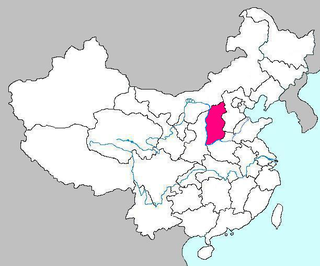
The Oberlin Band was a group of Christian missionaries in China from Oberlin College in Ohio. Members of the Oberlin Band worked in Shanxi province from 1882 until 1900. During the Boxer Rebellion in 1900, the 15 missionary men, women, and children of the Oberlin Band were among the foreign missionaries executed by order of the provincial government or killed by Boxers and soldiers.
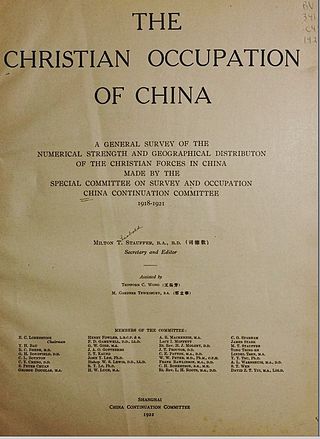
The Christian Occupation of China: A General Survey of the Numerical Strength and Geographical Distribution of the Christian Forces in China, Made by the Special Committee on Survey and Occupation, China Continuation Committee, 1918-1921 is a book published in 1922 simultaneously in English and Chinese by the Special Committee on Survey and Occupation, commissioned by the China Continuation Committee, headed by Milton T. Stauffer, assisted by Tsinforn C. Wong, and M. Gardner Tewksbury. The volume was intended as a progress report on the status of Christian churches in China, including social and economic background and local conditions, in preparation for foreign missionaries to turn control over to Chinese Christians, but instead, partly because of the provocative title of the English version, was one of the provocations of anti-Christian movements of the early 1920s.

Deborah Matilda Douw (1835-1911) funded and took part in missionary work in China. In 1900 she was caught up in the Boxer Rebellion.

Sarah Luella Miner was an American educator and a Christian missionary in China from 1887 until her death in 1935. She founded and led the North China Union College for Women, China's first women's college.
The history of Baptist Christianity in Sichuan began in 1890 when missionaries began arriving from the United States. Baptist missionaries in Sichuan were organized under the American Baptist Missionary Union, later renamed American Baptist Foreign Mission Society. Missionary activity in China generated controversy among many native Chinese and faced armed opposition during both the Boxer Rebellion and the later Communist movement in China. Although the former did not affect Sichuan so much as some other parts of China, the province was one of the hotbeds of anti-missionary riots throughout its ecclesiastical history.
References
- Brackney, William H. (1998), "Elwood Gardner Tewksbury (1865—1945)", Biographical Dictionary of Chinese Christianity
- Thompson, Larry Clinton (2009). William Scott Ament and the Boxer Rebellion: Heroism, Hubris, and the "Ideal Missionary". Jefferson, NC: McFarland. ISBN 978-0-78645-338-2.